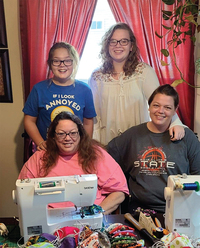What started as keeping family members safe during the Covid-19 pandemic magnified into four generations spending the last four months helping others stay safe too.
At first thought, Ariel Pederson wanted to make some masks for her family, especially her mom, Deb Marlow. She was nervous about her mom’s health since she was at a higher risk of contracting the virus. After persuading her mom to make masks as a team project, soon her daughters Keira and Kensi were helping too. Grandma Bonnie Marlow would also help during her visits.
Deb has sewn for years with various experience in making clothes, quilts, and crafts. Ariel didn’t have quite as much experience. “I know enough to get myself in trouble,” she laughs. The two began looking at patterns and found one on the Avera website for masks that would fit over the N95 masks.
There they found the Olson pattern.
Deb thought “Well this is simple; we can do this.” Ariel laughs, “We printed out the pattern and it took us two hours to make the first mask because it wasn’t as simple as 1-2-3-4-5.” Needing more guidance, they turned to You Tube and found a video where the actual nurses demonstrated step by step how to make the same Olson mask.
“That was our main way of finding out how to do it,” Ariel reflects. Though the process was slow at first, it became easier as they made their first 100 masks and donated them to the Avera Sacred Heart Hospital in Yankton.
They first started making masks individually, each one making one mask at a time, communicating through Messenger through their process to motivate each other. Ariel found herself getting absorbed in the task and working through the night into early morning; she finally set a time when she would stop for the night. After a month and a half of working individually, they decided it would be more efficient to work together at making the masks so they set up their sewing station at Deb’s house, equipped with Deb’s and Ariel’s sewing machines. Rather than making each mask from start
to finish, they found it was more efficient to make several masks in each step before moving on to the next step. Ariel completed the 1st and 3rd steps while Deb took care of the 2nd and 4th steps. Soon fourteen-year old daughter Kiera was helping cut fabric and assisting with some of the other steps. Nine-year old Kensi jumped in and became the “helper’s helper” as Ariel explained, getting them whatever they needed, including a neck massage here and there. Eighty-six-year-old grandma Bonnie Marlow assisted during her visits.
Along with adjusting the process, they have tweaked their masks over time, the first change switching to a different version of the Olson mask. “That one was fun,” Ariel recalled. They tried a pleated mask as well but soon found that they were more difficult. Ariel laughs as she explains how frustrating the pattern was for her.
They’ve made adjustments to the mask filters and the design of the masks. They’ve been able to adjust the earpieces to better accommodate those with hearing aids and making the mask straps to fit around the head instead of around the ears, to better accommodate those who may not be able to wear a traditional mask, for instance those who might wear a hard hat. They are going by recommendations from the CDC for each group they are making for and have discovered a new pattern that they will revamp for the children’s masks.
“We’ve adapted a lot for a lot of different people,” Ariel states.
As they became more experienced, their process became even more efficient; they can now comfortably make around 75-100 masks in an afternoon. Their donations continued beyond the hospital to include friends, family, neighbors, and the Navajo Nation Indian Reservation. As their materials became scarce, they found they had to pay more to get them. Making so many masks was no longer feasible for them and they realized that they had to charge a small fee to cover the cost of material. Negotiating on price, they settled with $5 each, just enough to cover the cost of the cloth, elastic and thread.
Soon large orders began coming in: Applied Engineering, Ability Building Services, Larry’s Heating and Cooling, SD Game Fish and Parks and a trucking business became their next customers.
Ariel admits, “There is a need, there is a want. It makes me feel really bad to sell them. I just want to make them and give them away!”
There have been others who have played a role in their project. Tony Radack gave them their first donation to buy fabric and Jennifer Coffee has played a large role in supplying fabric. They developed camaraderie on Facebook mask-makers groups, learning from others with a similar interest. After applying for free nosepieces from the International Association of Sheetmetal Workers, they generously sent her 500 pieces.
Ariel has started a keepsake to remind herself of their experience during this time. She’s been working on a crumb quilt for Kiera that she calls her “Covid quilt” where various sizes of scraps from all their mask material are incorporated in the quilt. “I want her to remember why we did this,” Ariel explains. “Why we were doing this for people. I want her to be able to tell her children ‘I was here for Covid, I helped.’”
They’ve made approximately 1,200 masks with no intention of stopping. Ariel is happy to help others and welcomes contact or questions by sending her a private message through Facebook Messenger.
“It makes me very, very proud to see someone wearing one of our masks. It makes me really happy to see people helping other people,” Ariel reveals.




